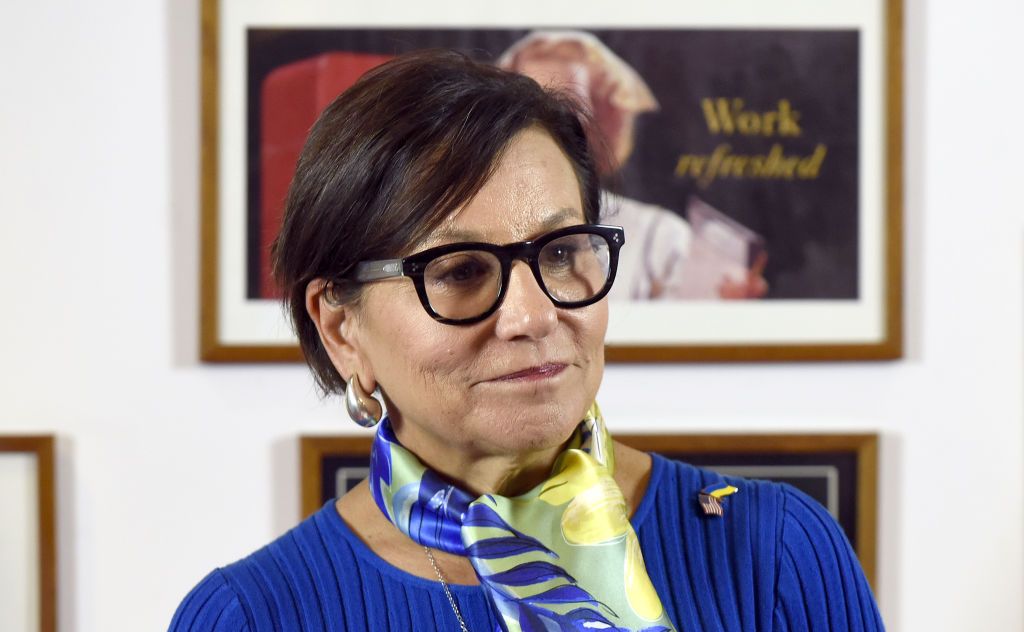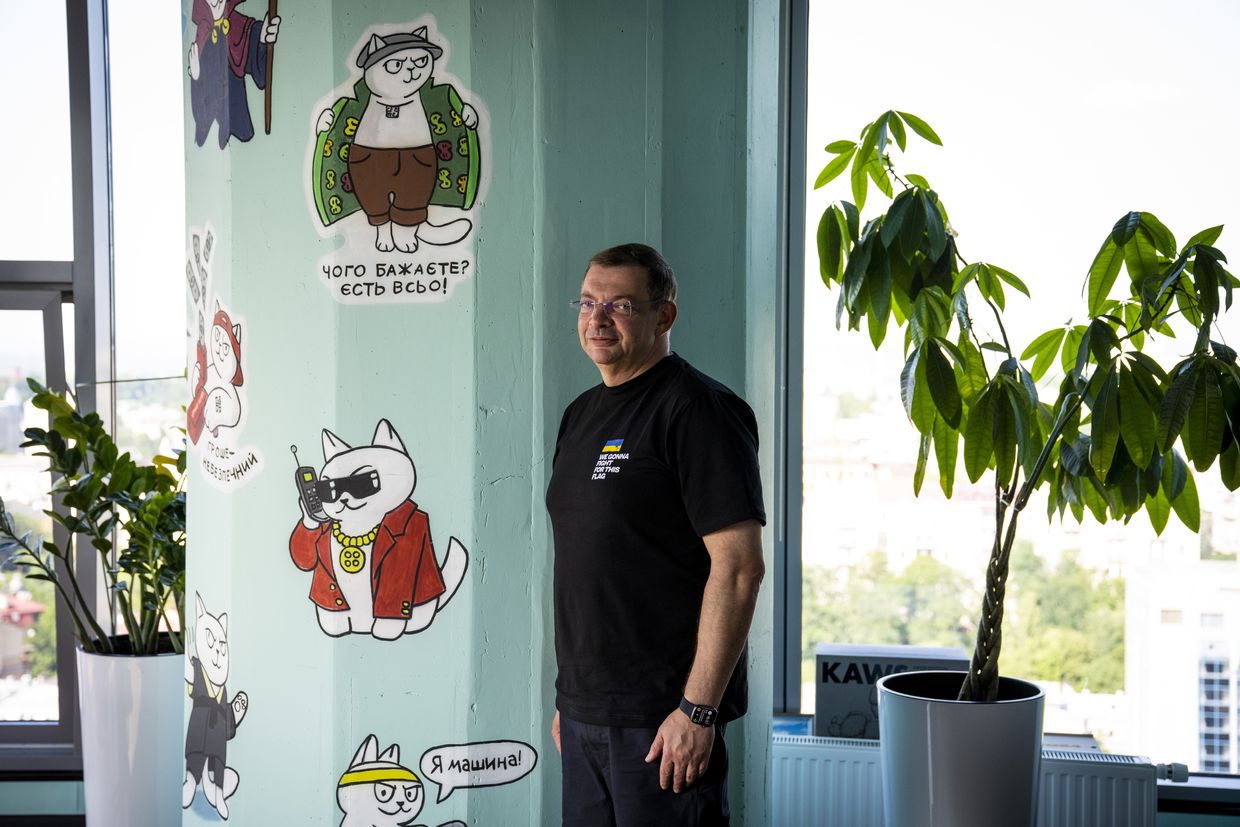Can Ukraine’s economy survive without foreign aid? Experts aren’t sure

As Russia’s full-scale war approaches the two-year mark, Ukraine is headed for economic turbulence as vital external financial help hangs in the balance.
As the Ukrainian government spends all of its revenue on the military, it relies on international aid from its Western partners. The budget deficit is expected to reach $44 billion and Kyiv is hoping to cover it with both domestic borrowing and financial aid from abroad.
The Finance Ministry says the country will need around $37 billion in external financing next year, a slight decrease from the previously expected $41 billion. The total has been trending downward as the ministry ostensibly looks to cut costs where it can.
Ukraine’s needs will likely look closer to somewhere between $6-6.5 billion per month in 2024 to cover expenses, according to a former Ukrainian lawmaker with knowledge of current budgeting issues who asked not to be named due to the sensitivity around this issue.
The country can cover around $2 billion with taxes and another $1 billion from the issuance of debt and obligations, meaning Ukraine has to come up with around $3.5 billion per month, or $42 billion, this coming year, the former lawmaker said.
With pledged help from some partners, including the U.K., Japan, and the IMF at around $10 billion, the country would still face a hole of some $32 billion. The timing of when financing is disbursed will also determine if Ukraine can walk the tightrope.
Meanwhile, a 50-billion-euro aid package and $61 billion in help from the U.S. remained tied up in political battles.
The government is mulling various options, including the sale of domestic bonds, tax collection, or printing money, but these solutions can only cover the first two months of the year and risk hurting the economy in the long term.
Despite a few backup plans, there’s no miracle solution to keep Ukraine’s economy going without external help, Sergey Fursa, an analyst at investment company Dragon Capital.
“If help doesn’t come, there are no mechanisms to avoid the economy’s collapse,” Fursa said.
Foreign help
In order to prevent such a collapse, Ukraine desperately needs the aid currently pending on both sides of the Atlantic.
EU leaders failed to reach a deal on aid for Ukraine worth 50 billion euros after Hungarian Prime Minister Viktor Orban in mid-December 2023 vetoed the “Ukraine Facility” package. A Hungarian official recently said on Jan. 18 that a deal with EU on Ukraine aid was still far off.
European leaders are to reconvene on the matter on Feb. 1, while Orban signaled in early January that it might lift its veto if the aid is reviewed each year, according to undisclosed EU officials quoted by Politico.
“Even if we don’t receive funds under the “Ukraine Facility” plan, Ukraine has a plan B,” Economy Minister Yuliia Svyrydenko told the Kyiv Independent. “I’m confident we will secure funding.”

The European Commission is reportedly working on at least three to four scenarios to guarantee a certain amount of financial aid from the EU throughout 2024, according to the Economy Ministry.
The EU is also reportedly creating a debt-based plan worth up to 20 billion euros to fund Ukraine and circumvent Hungary's promised veto, the Financial Times reported on Dec. 26.
Meanwhile, the White House’s request for $61 billion in additional budget support has failed to garner enough support in Congress.
Republicans on Dec. 6 blocked a major aid bill, demanding that further support to Ukraine be tied to sweeping reforms to U.S. immigration policy, something Democrats say is non-negotiable.

Low reserves
If Ukraine doesn’t manage to secure foreign aid in time, the government and the National Bank of Ukraine (NBU) will have to resort to various solutions, but none of them can replace foreign aid in the long term, experts told the Kyiv Independent.
The government may have just enough reserves to last January and February, Hlib Vyshlinsky, the head of the Center for Economic Strategy, told the Kyiv Independent.
Dragon Capital estimates that the government finished 2023 with an estimated liquidity balance of $3-4 billion, Vyshlinsky said.
“Currently, we have reserves for the first months and are awaiting funding from our partners,” Svyrydenko said.

Ukraine managed to attract roughly $5 billion in December 2023, which may help the country get through for a couple of months, Danylo Hetmantsev, the chairman of the parliamentary finance committee, told media outlet RBC-Ukraine.
The NBU has $40 billion in international reserves. Still, the government can’t use them because they belong to the central bank, and if it uses all the reserves, Ukraine won’t have any tools to support the hryvnia’s value if it crashes.
Svyrydenko said Ukraine is also counting on confiscating frozen Russian state assets, but it’s a long shot.
It would require a strong, united response from Ukraine’s allies to transfer the $300 billion of Russia’s central bank assets frozen in Western financial pipelines since the start of the full-scale invasion.

U.S. President Joe Biden's administration reportedly backed legislation that would allow confiscating some frozen Russian funds and funneling them to Ukraine, Bloomberg reported on Jan. 10, citing three documents it had obtained.
Washington, Brussels, and Kyiv have long discussed legal ways of channeling these funds to aid Ukraine's reconstruction efforts, but it’s unlikely assets will be confiscated overnight.
Without large-scale funding from the EU and the U.S., pressure will build up, Vyshlinsky said.
“Ukraine will really need the help promised by the EU at the beginning of the year,” he said.
Manipulating money
Some fiscal solutions exist to mitigate the lack of funds, but most of them come with harsh consequences, economists say.
Ukraine could attract funding by selling domestic bonds, meaning getting loans from households and businesses in exchange for future reimbursement with interest, or selling some to friendly foreigners, but the process is limited because it’s cumbersome, Vyshlinsky said.
The government could resort to printing money like in December 2022 when faced with the EU’s potential failure to meet its commitments, but inflation went up 27% at the time, an experience the NBU is not eager to repeat.
Pyshnyy dismissed the idea of printing money, referring to last year when the central bank managed to avoid such an extreme solution.

“I do hope that our efforts will make it possible to come through 2024 the same way,” he said.
Vyshlinsky and Fursa warned against printing money as it could result in high inflation and growing poverty in the country.
“If you print money, you will destroy the country’s stability, and you will have huge devaluation,” Fursa said.
But devaluating the hryvnia could be another solution, an unavoidable one if external funding does not cover Ukraine's needs, Vyshlinsky said. A weaker hryvnia would mean the hryvnia equivalent of international aid could become larger, allowing for more spending.
Still, the hryvnia devaluation will not be able to compensate for the shortfall of tens of billions of dollars in the budget.
“It is not a solution to the funding problem itself.”
Tax increase
“To support one soldier, there need to be at least six people who work and pay taxes,” Svyrydenko said, pushing for businesses to work legally and pay taxes to fill the state’s coffers.
The state has already started to tax banks more to try and cover the deficit. In November 2023, lawmakers adopted a law increasing the income tax rate for banks from 18% to 25%, potentially bringing in over Hr 10 billion ($262 million) per year to the budget.
Lawmakers also retroactively increased the tax rate for banks for 2023 to 50%, bringing up to Hr 25 billion ($656 million) to the budget in 2024.
State tax and customs authorities have also collected $4.4 billion more in the 11 months of 2023 compared to the same period of 2022, Svyrydenko said.
“This indicates that businesses are recovering and paying more taxes,” she said.
Tax services are also moving to reduce the shadow economy, estimated in 2020 at $22 billion, nearly a quarter of Ukraine’s gross domestic product of 2018, according to an Ernst & Young study quoted by the NBU.
The shadow economy reportedly ranged from 25% to 70% in 2023, according to the European Business Association.

Taxing incomes from the shadow economy could yield promising revenues for the budget. Tax services’ efforts to tap into it in 2023 brought $1.6 billion to the state’s coffer for 2024, according to Hetmantsev.
“Businesses must operate legally and pay taxes,” Svyrydenko said.
In the meantime, redirecting surplus revenue from the local budget to the state could also bring in much-needed funds.
The state could turn to fiscal optimization, meaning redistributing limited resources from “non-urgent consumption” to priority budget needs, NBU Governor Andriy Pyshnyy told the Kyiv Independent.
At worst, the state could be forced to cut expenditures in areas that are not vital to the country’s defense capabilities and economic potential, Pyshnyy said.
The Economy Ministry has an eleven-point plan for 2024 to accelerate the country’s recovery and attract investments, thus bringing more money to Ukraine.
Among other ideas to boost the economy, the plan includes privatizing state-owned enterprises, which “are a burden for the state, but have prospects for growth,” Svyrydenko said.
The government may need to cut expenditures on everything except wages and pensions, and new mobilization and defense procurement will also be under threat, Vyshlinsky said.
The threat of gripping the states’ finances due to lack of funds is serious.
Ukraine might have to delay paying wages for half a million civil servants and 1.4 million teachers, as well as benefits for 10 million pensioners if foreign aid doesn’t come through, Svyrydenko told Financial Times in December.
The government may have to turn to austerity measures if it doesn’t receive foreign aid, meaning cutting non-essential expenditures until the economic situation stabilizes, asking more of Ukrainian citizens already struggling due to the war.
“Each of us must contribute to victory,” Svyrydenko said. “Our economic self-sufficiency is a matter of national security.”














